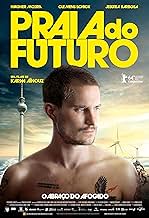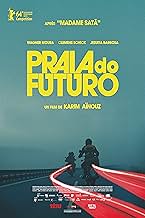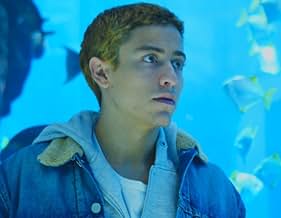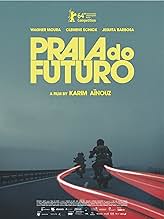VALUTAZIONE IMDb
6,3/10
3516
LA TUA VALUTAZIONE
Aggiungi una trama nella tua linguaShortly after failing to rescue a drowning man, Donato meets Konrad, a friend of the victim. They soon begin a relationship which seems doomed from the start, while Donato's past catches up ... Leggi tuttoShortly after failing to rescue a drowning man, Donato meets Konrad, a friend of the victim. They soon begin a relationship which seems doomed from the start, while Donato's past catches up with him.Shortly after failing to rescue a drowning man, Donato meets Konrad, a friend of the victim. They soon begin a relationship which seems doomed from the start, while Donato's past catches up with him.
- Regia
- Sceneggiatura
- Star
- Premi
- 11 vittorie e 20 candidature totali
Demick Lopes
- Capitão Motta
- (as Démick Lopes)
Yannik Burwiek
- Filho de Heiko
- (as Yannik Burwieck)
Jesuíta Barbosa
- Ayrton - 18 anos
- (as Jesuita Barbosa)
Recensioni in evidenza
An award-winning screenwriter once told me the secret to his success. It's knowing and never forgetting the essence of film (and this holds true for directors, actors, cinematographers, make-up artists, and production designers as well).
Simply put, "A movie is a story that's told with pictures. Pictures that move." Every line, every shot, every scene, every setting, every prop, should be informed by this.
Few films exemplify this as well as Karim Aïnouz' "Praia do Futuro." Ainouz has said, "For me film is time, space, and sound distilled in a moving image."
It's also, you can see clearly from this film, about bodies moving in time and space and within architecture.
(There's one memorable scene of muscular lifeguards training on the beach and then running into the sea that's right out of poet Walt Whitman's "I Sing the Body Electric.")
Every shot, every scene in this spare, visual style of storytelling is a work of art, which shouldn't be surprising as Ainouz came to film making in a roundabout way, leaving Fortaleza, Brazil (where the opening of "Praia do Futuro" is set) to study architecture in Brazil's futuristic capital, Brasilia. He then studied fine art in New York, took up painting and photography, only to finally study film in graduate school at NYU. He sees himself primarily as a visual artist.
This is a film about fear and courage, about risking it all. It's also about displacement and freedom. But, unlike Hollywood films, it never spells anything out. These ideas are dealt with elliptically and obliquely and usually through movement and visuals rather than through dialogue. The protagonists move through water and dance and speed-race motorcycles through breathtaking scenery and they make passionate, sensual love.
If you like things spelled out for you and wrapped up with a bow this is not the film for you. Much of what happens, happens off-screen. Characters don't talk about their feelings or reveal much through dialogue and the ending is cryptic. But pay attention: It's the visuals and motion and actions that reveal everything.
And about that ending--there is some actual "telling" rather than showing in the end (don't worry, it's not a spoiler) and it's so emblematic of the film I'll cite it here. As we see two motorcycles disappear into the gray mist on a twisting, turning German autobahn, Donato, in a voice-over, addresses his brother, the one he'd abandoned eight years earlier when he left Brazil for Germany.
"There are two types of fear and courage, Speed. I act as if there is no danger. But you know that everything is dangerous in this endless sea."
"Praia do Futuro" invites you to take a swim, take a risk, try your luck. It doesn't promise a happy ending, but it doesn't preclude one, either.
Simply put, "A movie is a story that's told with pictures. Pictures that move." Every line, every shot, every scene, every setting, every prop, should be informed by this.
Few films exemplify this as well as Karim Aïnouz' "Praia do Futuro." Ainouz has said, "For me film is time, space, and sound distilled in a moving image."
It's also, you can see clearly from this film, about bodies moving in time and space and within architecture.
(There's one memorable scene of muscular lifeguards training on the beach and then running into the sea that's right out of poet Walt Whitman's "I Sing the Body Electric.")
Every shot, every scene in this spare, visual style of storytelling is a work of art, which shouldn't be surprising as Ainouz came to film making in a roundabout way, leaving Fortaleza, Brazil (where the opening of "Praia do Futuro" is set) to study architecture in Brazil's futuristic capital, Brasilia. He then studied fine art in New York, took up painting and photography, only to finally study film in graduate school at NYU. He sees himself primarily as a visual artist.
This is a film about fear and courage, about risking it all. It's also about displacement and freedom. But, unlike Hollywood films, it never spells anything out. These ideas are dealt with elliptically and obliquely and usually through movement and visuals rather than through dialogue. The protagonists move through water and dance and speed-race motorcycles through breathtaking scenery and they make passionate, sensual love.
If you like things spelled out for you and wrapped up with a bow this is not the film for you. Much of what happens, happens off-screen. Characters don't talk about their feelings or reveal much through dialogue and the ending is cryptic. But pay attention: It's the visuals and motion and actions that reveal everything.
And about that ending--there is some actual "telling" rather than showing in the end (don't worry, it's not a spoiler) and it's so emblematic of the film I'll cite it here. As we see two motorcycles disappear into the gray mist on a twisting, turning German autobahn, Donato, in a voice-over, addresses his brother, the one he'd abandoned eight years earlier when he left Brazil for Germany.
"There are two types of fear and courage, Speed. I act as if there is no danger. But you know that everything is dangerous in this endless sea."
"Praia do Futuro" invites you to take a swim, take a risk, try your luck. It doesn't promise a happy ending, but it doesn't preclude one, either.
"Beach" opens with two motorcycle riders riding along the sand, and cooling off in the waters of a nearby beach; When one of them drowns, the lifeguard tries, but fails to save him. The lifeguard Doni, ( Wagner Moura) strikes up a "friendship" with the buddy of the guy that was lost (Clemens Schick). Lots of hot guys. The friendship turns into more... but the plot development moves pretty slowly. Konrad wants Doni to stay, but Doni wants to get back to his job and his family. Full frontal nudity. Lots of butt shots. Not a lot of dialogue, but maybe that's part of the charm. A whole lot of dancing in nightclubs. Some GREAT scenes of a giant indoor aquarium, and also many ocean scenes. Then his family issues catch up with him. Doni must decide what's important to him. The ending was a little metaphysical, but you can judge for yourself. Certainly worth the price of a DVD on amazon.com.
Directed by Brazilian director Karim Aïnouz, who has done numerous films. Co-wrote this with Felipe Bragança. Very Euro.
Directed by Brazilian director Karim Aïnouz, who has done numerous films. Co-wrote this with Felipe Bragança. Very Euro.
beautiful, bitter, useful. a film about relations and choices. delicate poetry and good performances. not comfortable but touching for its honesty, for the landscapes, for the dialogs and for the grace of silence. a film about love and its decision, about guilt feelings and about gestures who are only exercise to know happiness. about the responsibility. and about the past who remains the skin of present. short- a beautiful film. not in ordinary manner but that detail defines it. because it is the work of an admirable director who use the right nuances for a story who might be almost cruel. a gentle speech about the sense of life.
The thing that struck me the most about this movie is how beautiful it is, and I mean literally, aesthetically. Not only is the scenery gorgeous, but also its camera work is outstanding: Praia do Futuro's shots are absolutely amazing, most scenes could be made into pictures to be hung on the walls of an art gallery - there could probably be a whole exposition just made with screenshots of this movie.
The film's appeal, however, doesn't go much beyond that. Its plot had potential, the trailer made it seem like it would be intense and deeply emotional, yet the whole story is quite dull, with some unclear or poorly explained parts and underdeveloped dialogue. The characters don't lack depth per se, but their personalities were rather shallowly explored, perhaps hindered by the lack of vocal expression or by the stumbling plot.
Contrarily to what a review I read (in another website) suggested, I did not feel like this movie was too cliché-ridden, and the unoriginal moves were fairly understandable, as they could be justified by either the situation in which they were inserted or the characters' psyche. Yet, I feel the innovative elements were obscured by the overall dephtlessness of the whole production and great ideas and quotes were lost in senselessness and barely-existent dialogue.
This is definitely not a bad movie, it was just not enough to touch or affect me in any way.
The film's appeal, however, doesn't go much beyond that. Its plot had potential, the trailer made it seem like it would be intense and deeply emotional, yet the whole story is quite dull, with some unclear or poorly explained parts and underdeveloped dialogue. The characters don't lack depth per se, but their personalities were rather shallowly explored, perhaps hindered by the lack of vocal expression or by the stumbling plot.
Contrarily to what a review I read (in another website) suggested, I did not feel like this movie was too cliché-ridden, and the unoriginal moves were fairly understandable, as they could be justified by either the situation in which they were inserted or the characters' psyche. Yet, I feel the innovative elements were obscured by the overall dephtlessness of the whole production and great ideas and quotes were lost in senselessness and barely-existent dialogue.
This is definitely not a bad movie, it was just not enough to touch or affect me in any way.
Donato (Wagner Moura -'Elite Squad') is a lifeguard at 'Praia do futuro' and gets called into action one day when two German tourists get into trouble in the turbulent surf. Donato is unable to save him but afterwards meets Konrad - this is the friend of the drowned man and he is gay - just like Donato.
Well one thing leads to another and they get romantically entwined. It is a relationship built on lust and though that can survive for a while it always seems doomed to failure. Whilst the inevitable catches up on the love front, Donato seems to have also, not run, but ambled away from his past and family. That is a past with a memory and it is just as inevitable that it too will catch up with him.
Now this is a very well made and observed film, with some stunning scenes and a confidence to know when to ramp up the ante and when to let it meander by in a pique of self absorption. There is a smattering of bedroom action, but simulated and nothing over the top. This is a relationship piece more than anything else and covers most of the bases. It has a full range of emotions too and reactions but approaches its subject from the view that there is essentially good in all of us. This is a film for those who want to be made to think and if that floats your boat then I think you will get a lot from this film.
Well one thing leads to another and they get romantically entwined. It is a relationship built on lust and though that can survive for a while it always seems doomed to failure. Whilst the inevitable catches up on the love front, Donato seems to have also, not run, but ambled away from his past and family. That is a past with a memory and it is just as inevitable that it too will catch up with him.
Now this is a very well made and observed film, with some stunning scenes and a confidence to know when to ramp up the ante and when to let it meander by in a pique of self absorption. There is a smattering of bedroom action, but simulated and nothing over the top. This is a relationship piece more than anything else and covers most of the bases. It has a full range of emotions too and reactions but approaches its subject from the view that there is essentially good in all of us. This is a film for those who want to be made to think and if that floats your boat then I think you will get a lot from this film.
Lo sapevi?
- QuizAccording to Clemens Schick, he and Wagner Moura did not get along when they first met, but became close friends after filming their scenes.
- BlooperWhen Konrad drives around on a KTM in Germany, the motor noise you hear is clearly from a 4-in-a-row cylinders engine. But KTM only manufactures 1 and 2 cylinders motors that would never sound like this.
- Versioni alternativeThe first love scene in the film's Part II section (containing footage of oral sex being performed) was cut in the theatrical/home video release.
- Colonne sonoreHeroes
Written by David Bowie and Brian Eno
I più visti
Accedi per valutare e creare un elenco di titoli salvati per ottenere consigli personalizzati
- How long is Futuro Beach?Powered by Alexa
Dettagli
- Data di uscita
- Paesi di origine
- Siti ufficiali
- Lingue
- Celebre anche come
- Futuro Beach
- Luoghi delle riprese
- Aziende produttrici
- Vedi altri crediti dell’azienda su IMDbPro
Botteghino
- Budget
- 4.000.000 USD (previsto)
- Lordo Stati Uniti e Canada
- 20.262 USD
- Fine settimana di apertura Stati Uniti e Canada
- 3324 USD
- 1 mar 2015
- Lordo in tutto il mondo
- 779.835 USD
- Tempo di esecuzione
- 1h 46min(106 min)
- Colore
- Proporzioni
- 2.35 : 1
Contribuisci a questa pagina
Suggerisci una modifica o aggiungi i contenuti mancanti













